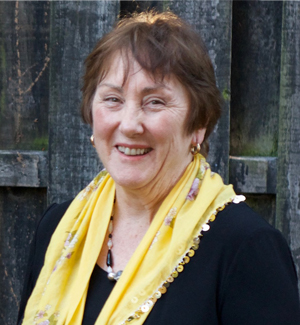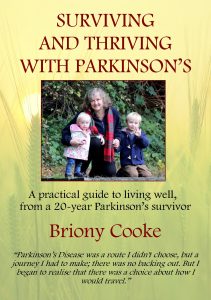
Dilys Parker
Age diagnosed: 57
Specialist interest: Supporting others with Parkinson’s
I was diagnosed in 2008, while living in the UK. My response was to learn as much as I could about PD. I am very fortunate to have been in the UK at this time because as well as good health care I met many wonderful people with PD in Britain and Europe. The Cure Parkinson’s Trust (CPT) and later Parkinson’s Movement was at the centre of all this. Their inclusive model of working is affirming and leads the way in showing how the voices of people with Parkinson’s can be heard and valued. I returned to NZ in 2013.
Read below an excerpt by Dilys from Surviving and Thriving with Parkinson’s.
Being diagnosed and the time following is a time of upheaval and change. We find ourselves trying to rebuild our sense of who we are when past certainties are no longer certain. As if this isn’t enough to be occupying our thinking, we may read or someone may suggest we take a look at participating in clinical trials. I found myself volunteering for a number of small trials from quite early on.
Some were about the experience of living with Parkinson’s, qualitative studies. These included the half day jaunts with a friend to an office located in the city. We filled in questionnaires or answered the questions asked. We left about two hours later with a gratuity that covered transport and a meal, a pleasant outing. Another time we were visited in our home by the researcher, who was particularly interested in the thoughts and experience of partners.
Some were clinical trials with a quantitative research approach. Twice I gave blood for DNA analysis Another time the research was about autonomic function in early Parkinson’s. I remember that trial well, because after the morning appointment I had arranged to meet a friend at the cemetery. Now I don’t make a habit of frequenting cemeteries, but this was a famous one with famous people buried there, and it was a pleasant day for a walk. What I hadn’t realised was that part of the trial involved monitoring blood pressure for twenty-four hours. There I was strolling among the tomb stones with a blood pressure cuff on my upper arm. It would noisily inflate at regular intervals intruding on the pleasant atmosphere of cicada sounds and bird song.
The most recent trial I volunteered for was also the most demanding. I underwent brain surgery and a year’s intensive monitoring followed. Why do I continue to be involved in trials? There are a multitude of motivating factors but there are also some potentially negative effects or outcomes. Here are my C’s of research.
Consider trials in the early days. It is worth checking out if there are any suitable before you begin medication. Are there any in your area looking for untreated patients? I know of people who have been able to trial new and novel therapies long before they hit the market.
Commitment to following through is important. Do I have the time and the interest in this trial? Equally, if not more significant, is finding out what the researchers and their funders commitment is to you. Do they cover expenses? If the treatment is successful will you be able to continue it at the end of the trial?
A Contribution to the greater good can be a motivator. Being in a trial often means we are helping in the search for treatments that will improve our lives. Many research projects do not start on time because they struggle to get enough participants. Ultimately it is those of us with Parkinson’s whose wellbeing is compromised by time delays.
Community is important for people affected by Parkinson’s. It is developed through a sense of connection. Having a shared research experience can provide a welcome and often unexpected connection with others.
Focused Care has been a prime a motivator for me to undertake trials. I appreciate the attention of Parkinson’s experts and the time spent with them. As well as learning more about the condition and my own version of it, I am encouraged to become reflective. Through this I have learn to identify and monitor factors that contribute to my wellbeing.
Caution is required before agreeing to any trial. Expectations and trial provisions vary. The questions that we ask may be the same, but the answers are likely to be quite different depending on the country where you live. Do your homework. A lot is documented in the informed consent literature. Consider if the research will ultimately benefit the Parkinson’s community or will it be just an academic exercise. Find out what happens if there is an adverse event and who pays for research related injuries. Find out how and when you will be informed of outcomes? If you receive the placebo, what happens if the results are positive? Will you be offered the treatment and will it be free?
Once upon a time I thought I was bullet proof, and in control of my world. I had ideas of what I wanted to do with my life and how my future was going to unfold. To have Parkinson’s rudely intrude was never a part of the plan, but it did. Being involved in clinical trials is a choice. A choice that was offered when it seemed many of my choices had been taken away. Research trials have been a positive experience for me, I think they are worth considering.
Original version published in Surviving and Thriving with Parkinson’s by Briony Cooke. Used with permission.
- Attended WPC 2010, 2013, 2016
- WPC Ambassador 2016
- Former Board Member Parkinson’s New Zealand
- Member local committe of PNZ
- Participated in the 1st EPDA Unity walk in Amsterdam 2012
- Participated in the Parkinson’s Unity Walk in New York 2009
- Participant in PD research and trials in UK and NZ
- Previous contributor and Assistant Editor PM magazine “On the Move”

